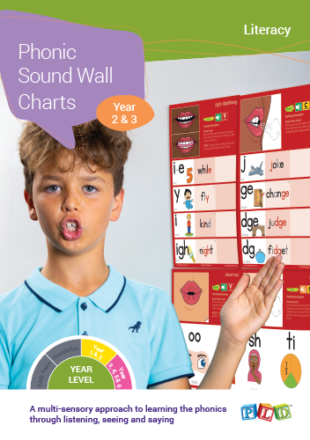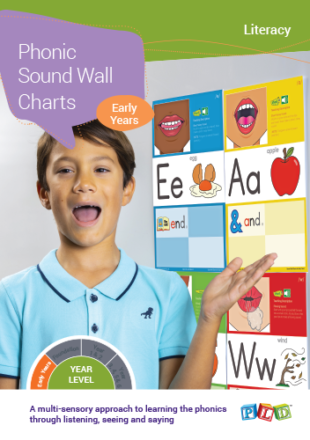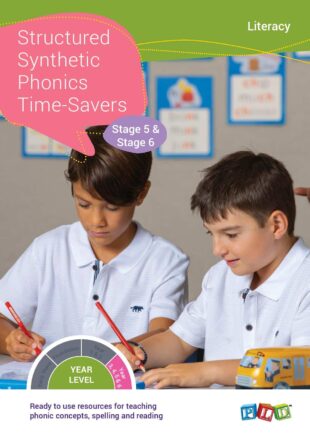School Licences
Showing 65–80 of 130 results
-
High-Frequency Words Within SSP

Research suggests that when newly encountered words are not sounded out, they are poorly remembered. This is important when we approach the teaching of HFW. Although some irregular words cannot be decoded phonetically, the vast majority of HFW are either fully or partially decodable. Heart Words are HFWs that contain an irregular concept which cannot be decoded or a complex phonic concept not yet learned. The difficult part of these words must be learned by heart. This program focuses on the full set of Stage 1, 2 and 3 heart words. It outlines a multi-day scripted process for teaching the reading and spelling of heart HFWs. The program includes charts, games and scripted instruction flash cards.
$82.50$82.50 incl. GST[flipbook-popup id=''][/flipbook-popup] -
Phonic Sound Wall Charts for Year 2 & 3

What are the features of PLD’s Sound Wall Charts? Teaching the 44 speech sounds of the English language requires accurate modelling and articulation, pedagogy that sound walls support. The PLD sound wall charts focus on the phonemes (or individual sounds) of speech and link to the PLD scheduled phonic sequence. Each phoneme-specific chart features: Charts focused upon the phonemes and phonics for an Early Years class. The corresponding visual of a mouth. A simple description (e.g. tongue tapping sound, lip popping sound, peeking tongue sound, coughing or huffing sound) A detailed description. Icons identifying if the phoneme is a long or short, quiet or noisy, or vowel or consonant sound. Areas to add words (making the charts interactive rather than static). The related phonic concepts for each year level. What is a sound wall display? A sound wall is an interactive display of phonic concepts and words that is organised by and/or emphasises individual sounds (phonemes). Commonly there is one wall for consonants and one for vowels. Sound walls focus on the formation of phonemes which gives young students a structure that helps them understand the foundation of language and written literacy. As we know from current research about the science of reading, children learn to read through the application of orthographic mapping, a speech-to-print process where letters are mapped to known speech sounds. Teachers need to harness this modern understanding by using sound wall displays as a teaching and learning tool in their classrooms to support the process of learning to read and spell. Other Sound Wall Charts Pack: Phonic Sound Wall Charts for the Early Years (26 A4 coloured charts which focus on the alphabet) Phonic Sound Wall Charts for Foundation (42 A4 coloured charts which focus on the alphabet and Stage 1 digraphs) Phonic Sound Wall Charts for Year 1 (49 A4 coloured charts which focus on Stage 1 & Stage 2 digraphs) Phonic Sound Wall Charts for Year 2 & 3 (71 A4 coloured charts which focus on Stage 1, Stage 2 & Stage 3 digraphs) Full Set of Phonic Sound Wall Charts Recommended Reading: Tips for Getting the Most Out of Sound Wall Charts Sound Walls & Structured Synthetic Phonics Programs
$55.00$55.00 incl. GST[flipbook-popup id=''][/flipbook-popup] -
Phonic Sound Wall Charts for Year 1

What are the features of PLD’s Sound Wall Charts? Teaching the 44 speech sounds of the English language requires accurate modelling and articulation, pedagogy that sound walls support. The PLD sound wall charts focus on the phonemes (or individual sounds) of speech and link to the PLD scheduled phonic sequence. Each phoneme-specific chart features: Charts focused upon the phonemes and phonics for an Early Years class. The corresponding visual of a mouth. A simple description (e.g. tongue tapping sound, lip popping sound, peeking tongue sound, coughing or huffing sound) A detailed description. Icons identifying if the phoneme is a long or short, quiet or noisy, or vowel or consonant sound. Areas to add words (making the charts interactive rather than static). The related phonic concepts for each year level. What is a sound wall display? A sound wall is an interactive display of phonic concepts and words that is organised by and/or emphasises individual sounds (phonemes). Commonly there is one wall for consonants and one for vowels. Sound walls focus on the formation of phonemes which gives young students a structure that helps them understand the foundation of language and written literacy. As we know from current research about the science of reading, children learn to read through the application of orthographic mapping, a speech-to-print process where letters are mapped to known speech sounds. Teachers need to harness this modern understanding by using sound wall displays as a teaching and learning tool in their classrooms to support the process of learning to read and spell. Other Sound Wall Charts: Phonic Sound Wall Charts for the Early Years (26 A4 coloured charts which focus on the alphabet) Phonic Sound Wall Charts for Foundation (42 A4 coloured charts which focus on the alphabet and Stage 1 digraphs) Phonic Sound Wall Charts for Year 1 (49 A4 coloured charts which focus on Stage 1 & Stage 2 digraphs) Phonic Sound Wall Charts for Year 2 & 3 (71 A4 coloured charts which focus on Stage 1, Stage 2 & Stage 3 digraphs) Full set of Phonic Sound Wall Charts Recommended Reading: Tips for Getting the Most Out of Sound Wall Charts Sound Walls & Structured Synthetic Phonics Programs
$55.00$55.00 incl. GST[flipbook-popup id=''][/flipbook-popup] -
Phonic Sound Wall Charts for Early Years
What are the features of PLD’s Sound Wall Charts? Teaching the 44 speech sounds of the English language requires accurate modelling and articulation, pedagogy that sound walls support. The PLD sound wall charts focus on the phonemes (or individual sounds) of speech and link to the PLD scheduled phonic sequence. Each phoneme-specific chart features: Charts focused upon the phonemes and phonics for an Early Years class. The corresponding visual of a mouth. A simple description (e.g. tongue tapping sound, lip popping sound, peeking tongue sound, coughing or huffing sound) A detailed description. Icons identifying if the phoneme is a long or short, quiet or noisy, or vowel or consonant sound. Areas to add words (making the charts interactive rather than static). The related phonic concepts for each year level. What is a sound wall display? A sound wall is an interactive display of phonic concepts and words that is organised by and/or emphasises individual sounds (phonemes). Commonly there is one wall for consonants and one for vowels. Sound walls focus on the formation of phonemes which gives young students a structure that helps them understand the foundation of language and written literacy. As we know from current research about the science of reading, children learn to read through the application of orthographic mapping, a speech-to-print process where letters are mapped to known speech sounds. Teachers need to harness this modern understanding by using sound wall displays as a teaching and learning tool in their classrooms to support the process of learning to read and spell. Other Sound Wall Charts: Phonic Sound Wall Charts for the Early Years (26 A4 coloured charts which focus on the alphabet) Phonic Sound Wall Charts for Foundation (42 A4 coloured charts which focus on the alphabet and Stage 1 digraphs) Phonic Sound Wall Charts for Year 1 (49 A4 coloured charts which focus on Stage 1 & Stage 2 digraphs) Phonic Sound Wall Charts for Year 2 & 3 (71 A4 coloured charts which focus on Stage 1, Stage 2 & Stage 3 digraphs) Full Set of Phonic Sound Wall Charts Recommended Reading: Tips for Getting the Most Out of Sound Wall Charts Sound Walls & Structured Synthetic Phonics Programs
$55.00$55.00 incl. GST[flipbook-popup id=''][/flipbook-popup] -
Phonic Sound Wall Charts for Early Years – eBook
[flipbook-popup id=''][/flipbook-popup] -
Structured Synthetic Phonics Time-Savers – Stage 5 & 6
Ready to use resources for teaching phonic concepts, spelling and reading.
The Structured Synthetic Phonics Time-Savers for Stage 5 & Stage 6 program is designed to save time, simplify planning and to support educators in delivering impactful phonics lessons with ease. Aligned with the Phonic and Sight Word Sequence, the program includes resources that simplify lesson planning while delivering high-quality phonics instruction. The program is designed to support spelling and reading development through explicit instruction, practise and revision, ensuring that students achieve success in early literacy. Program Includes: A4 book: Spiral-bound, full colour and no preparation required. Stage 5 & Stage 6 Colour-Coded Word Lists: Fully prepared, colour-coded spelling lists that highlight phonic patterns and sound structures for easy teaching and learning. Student-Friendly Spelling Lists: Smaller, colour-coded versions of the word lists are provided for students, enabling independent learning and consolidation of concepts. Flashcards for Phonics Concepts: Bright, engaging flashcards to introduce and reinforce phonics concepts effectively. Rapid Automatic Reading Tasks: Focused activities designed to improve reading accuracy, speed and fluency. Weekly Spelling Routines: Clear templates and activity guides to help structure spelling lessons and provide consistent practice. Other Programs within the Range: Structured Synthetic Phonics Time-Savers – Stage 1 & 2 Structured Synthetic Phonics Time-Savers – Stage 3 & 4 Structured Synthetic Phonics Time-Savers – Stage 5 & 6 Structured Synthetic Phonics Time-Savers Stage 1-4 Junior & Middle Primary Set Full Set of Structured Synthetic Phonics Time Savers Links to the Teaching Sequence Manuals: This product can be used to support the implementation of the Year 3, 4, 5 & 6 Teaching Sequence Manual on pages 21 – 32.
$82.50$82.50 incl. GST[flipbook-popup id=''][/flipbook-popup]














